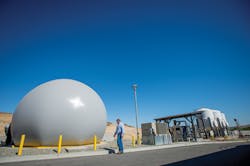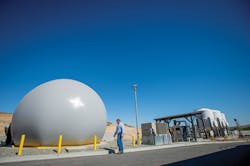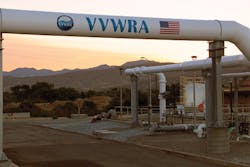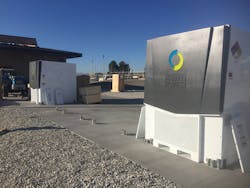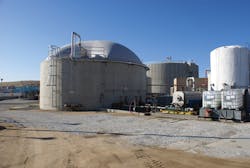Energy Storage: A Step Toward Energy Neutrality
Victor Valley Wastewater Reclamation Authority aims to become energy neutral by supplying all of its energy needs through onsite renewable sources
By Logan Olds
The Victor Valley Wastewater Reclamation Authority (VVWRA) is a partner of the U.S. Department of Energy’s (DOE’s) Better Plants Program, a voluntary initiative that helps drive energy efficiency improvements and cut costs in the manufacturing and industrial sectors. To date, VVWRA is one of more than 200 industrial organizations that have joined the program and its leadership is helping push boundaries in the energy efficiency space. As a part of VVWRA’s ambitious strategy to become energy neutral by supplying all of its energy needs through onsite renewable sources, it has embarked on a plan to establish an energy storage system at its Victorville, Calif., regional wastewater treatment plant.
Implementing New Technology
To reach its goal, VVWRA’s innovative energy project will demonstrate an advanced, pre-commercial flow battery energy storage and control system. When complete, the project will deploy a Primus Power flow battery system with the ability to provide up to five hours of support by supplying up to 200 kW at any point in time and up to 1,000 kWh per day when fully charged.
While on its path to reaching energy neutrality, VVWRA has already implemented a series of programs that convert biogas to energy, including a retrofitted, ultra-efficient anaerobic digester that supplies nearly all of the plant’s electricity needs. Once installed, the new battery system will allow the plant to better leverage these renewable energy assets.
Biogas generators help drive energy efficiency improvements and cut costs in the manufacturing and industrial sectors.
To achieve this, the battery system and its interaction with VVWRA’s onsite energy usage will be managed by an advanced microgrid control system designed by the University of California, Riverside (UCR). The controller is optimized specifically for the management, storage and deployment of renewable power generated through the utility non-export/minimum import agreement established between VVWRA and its electric utility, Southern California Edison (SCE). The battery system will be able to store or release energy during variable load periods so the facility can consistently operate at or near the 80 kW level required in the minimum import agreement, while maximizing use of all onsite biogas power generation capacity.
Ultimately, the Primus ENERGYPOD®2 storage system will enable VVWRA to harvest and redeploy excess renewable energy generated onsite, as opposed to turning down generator engines or installing dead-load banks. Stored power will be used to meet peak demand onsite with renewable energy rather than relying on grid-supplied electricity. VVWRA expects to reduce grid-supplied energy power consumption by more than 4.2 million kWh per year and reduce greenhouse gas emissions by 1,395 MTCO2e (million tons of carbon dioxide equivalents) per year. As a result of reduced energy consumption, VVWRA will realize $473,000 in annual energy cost savings.
The Victor Valley Wastewater Reclamation Authority looks to become energy neutral by supplying its own energy needs onsite.
benefits: water savings, increased reliability and low maintenance
Beyond reduced emissions and costs, this project offers VVWRA further benefits, including the potential for significant water savings and increased power reliability. For example, under existing conditions at VVWRA’s regional wastewater treatment plant, rapid fluctuations in the power supply can trip off a portion of the facility’s equipment, causing the effluent to exceed California’s strict Title 22 recycled water requirements. Currently, VVWRA must dispose of this water without any beneficial use. By implementing UCR’s control system and the Primus batteries, the risk of equipment shut down due to power fluctuations would be significantly curtailed, enabling water reuse and water savings in excess of 2.5 million gallons per year.
Due to its design, the battery system also provides additional advantages in the form of reduced capital, operating and maintenance costs as well as greater reliability. At VVWRA’s Victorville plant, the project will implement eight 25-kW, modular flow batteries, two 100-kW inverter units, and an innovative controller as well as some enhancements to the existing supervisory control and data acquisition (SCADA) system. Primus Power’s flow batteries feature a single flow loop architecture consisting of an electrolyte storage tank, pumps, electrode stacks, system controls and a single 100 kW inverter for every four ENERGYPOD 2 units. Unlike other flow batteries, the Primus system selected by VVWRA utilizes robust titanium electrodes and no membranes.
Ultimately, the Primus ENERGYPOD 2 storage system will enable VVWRA to harvest and redeploy excess renewable energy generated onsite, as opposed to turning down generator engines or installing dead-load banks.
The flow battery technology’s simplified system offers a more cost-effective electrode design and the overall architecture ensures fewer points of failure. As a result, battery hardware is expected to maintain full functionality for 20 years. Maintenance will be limited to monitoring the electrolyte, inverter replacement approximately every 10 years, and periodic maintenance of other moving parts. Primus Power will also utilize remote monitoring capabilities from its operations center to maximize VVWRA’s system uptime through preventative maintenance measures.
Another benefit of the system is that it does not require VVWRA to purchase new control hardware. The proposed flow battery will be operated by the UCR controller composed of innovative algorithms that leverage the facility’s existing onsite SCADA system. The SCADA system will collect data from the flow battery system, the existing onsite renewable power generators and the plant’s main electrical meter to monitor system status. The implemented algorithms will optimize plant energy sources among grid power, onsite biogas power generators and the flow battery in order to maintain power import levels at or near 80 kW.
VVWRA has already implemented a series of programs that convert biogas to energy, including a retrofitted, ultra-efficient anaerobic digester that supplies nearly all of the plant’s electricity needs.
Replicating Success
The battery system, combined with the UCR advanced microgrid controller, will create a reliable multi-decade renewable energy platform to save millions of dollars and produce millions of gallons of recycled water for VVWRA’s customers. However, these savings and advantages could have an even wider impact if this kind of system were replicated to serve other customers and industries. For example, the Primus energy storage system can be used across a wide variety of applications. Beyond water and wastewater treatment plants, it can bring significant benefits to many other industrial facilities that generate power. WW
About the Author: Logan Olds is VVWRA’s general manager and is responsible for its overall management, operations, maintenance and capital improvements program. He has 26 years of experience and holds multiple state certifications in the wastewater field. VVWRA serves 300,000 people in the California high desert region.
